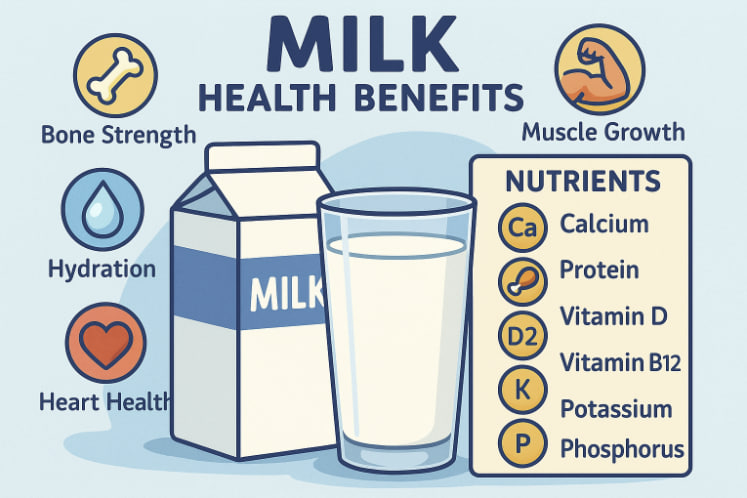Milk is one of the most widely consumed natural beverages in the world, valued for its rich nutritional profile and role in human development. From early childhood to adulthood, milk supports bone strength, cellular function, and general well-being. Whether consumed directly or used in dairy products like cheese and yogurt, milk remains a staple in many diets, contributing key vitamins, minerals, and proteins.
What’s in a Glass of Milk?
A standard glass (250 ml) of cow’s milk contains:
- Calcium – essential for strong bones and teeth
- Protein – high-quality, complete protein for muscle growth and repair
- Vitamin D – helps absorb calcium and supports the immune system
- Vitamin B12 – important for red blood cell formation and brain health
- Potassium – supports heart and muscle function
- Phosphorus – aids in energy production and bone health
Milk also contains healthy fats, carbohydrates (lactose), and small amounts of zinc, selenium, and other micronutrients.
Health Benefits of Milk
- Bone Strength: The combination of calcium, phosphorus, and vitamin D makes milk especially effective at preventing osteoporosis and maintaining bone density.
- Muscle Growth: Rich in casein and whey proteins, milk supports muscle recovery after exercise.
- Hydration: Milk naturally contains electrolytes, making it a good post-workout beverage.
- Heart Health: Some studies suggest that low-fat dairy may help reduce high blood pressure.
- Weight Management: Milk’s protein and fat content can promote a feeling of fullness, reducing overeating.
Types of Milk and Alternatives
- Whole milk (3.5% fat): Nutrient-rich but higher in calories.
- Low-fat and skim milk: Fewer calories, still a good source of nutrients.
- Lactose-free milk: Treated with lactase enzyme for lactose-intolerant individuals.
- Plant-based milks (almond, soy, oat): Good alternatives, often fortified with calcium and vitamin D, but may lack the protein of dairy milk.
Each type has different benefits and suitability based on dietary needs and preferences.
Is Milk for Everyone?
While milk is beneficial for many, some people may experience:
- Lactose intolerance – difficulty digesting milk sugar (lactose)
- Allergies – immune response to milk proteins (mostly in children)
- Ethical or environmental concerns – leading to plant-based choices
In such cases, fortified plant-based options or lactase supplements may be suitable alternatives.
Glossary
- Lactose: A natural sugar found in milk.
- Osteoporosis: A condition where bones become fragile due to mineral loss.
- Electrolytes: Minerals in body fluids that help maintain hydration and nerve function.
- Casein and whey: The two main proteins in milk.
- Fortified: Foods that have added nutrients not originally present.


